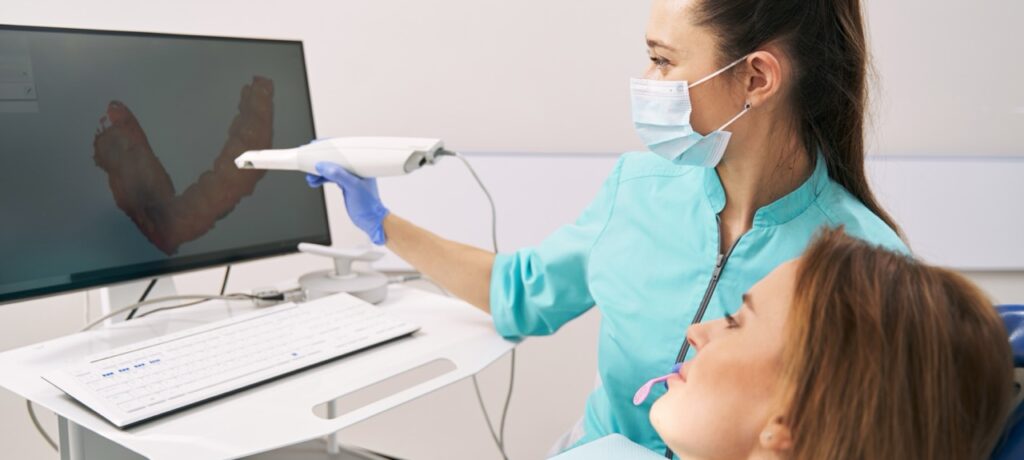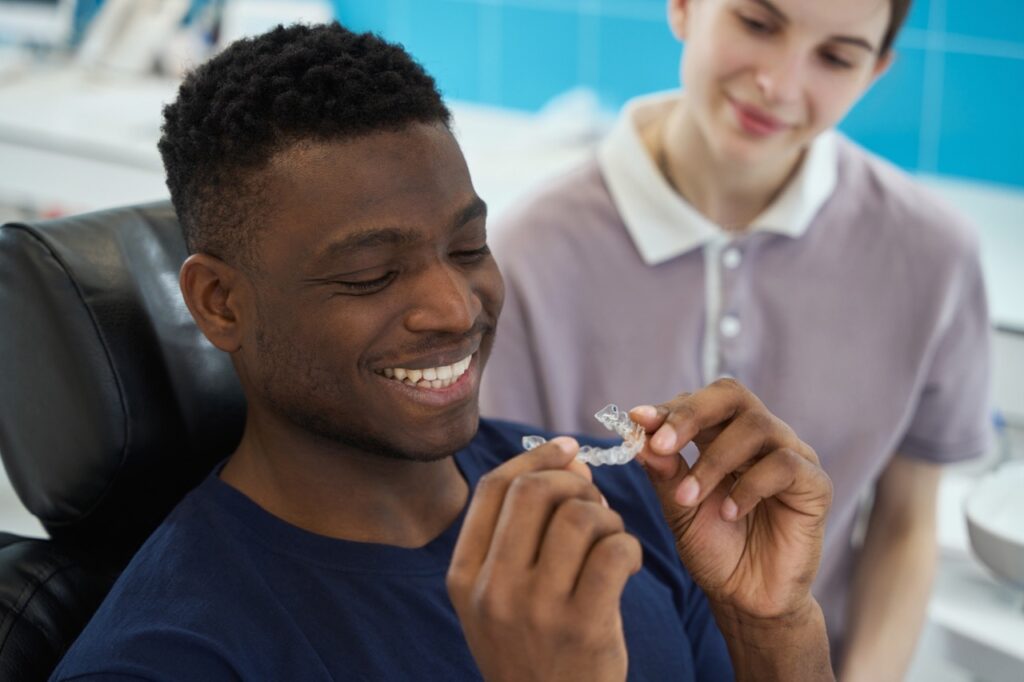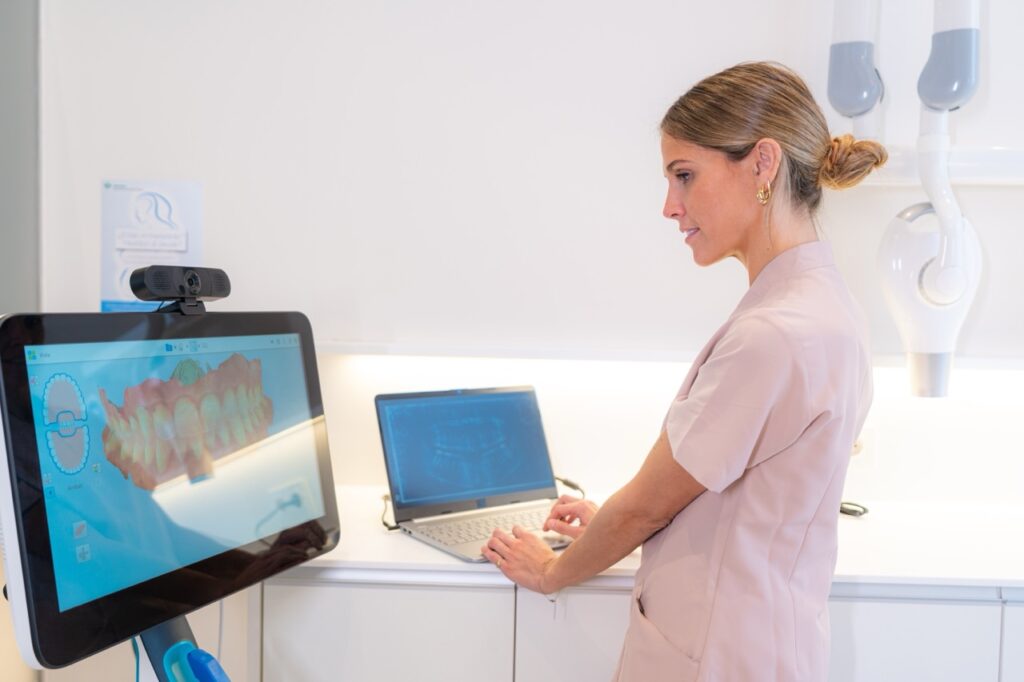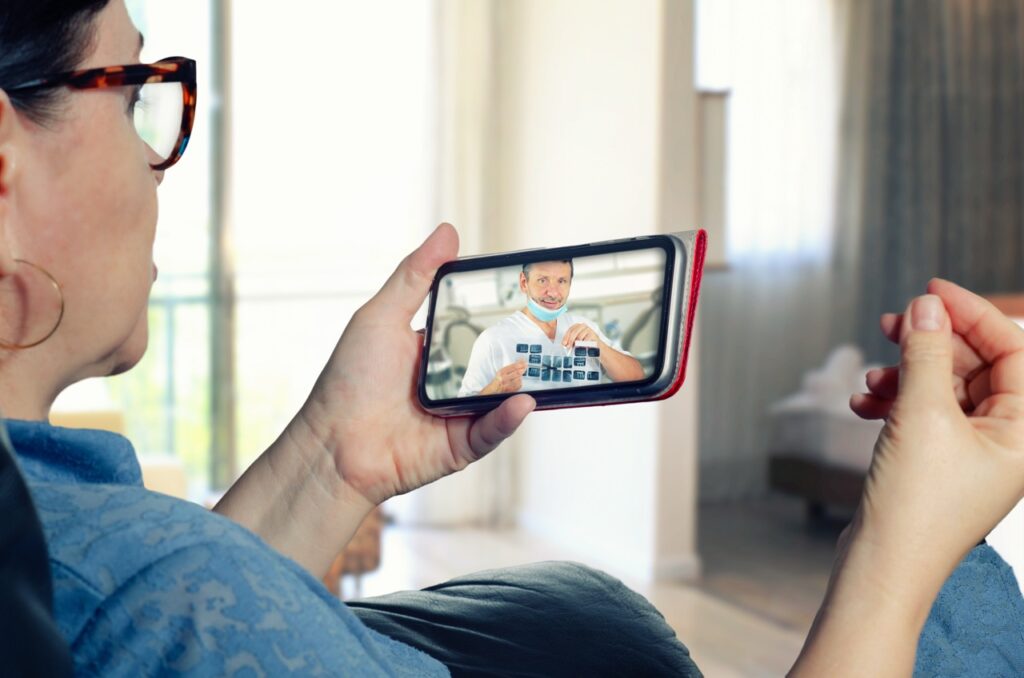Resource Library
Start Reading

Oral health care is evolving. Several trends driving innovation in other fields are also transforming how dentists deliver services and how patients experience them.
Here at Penn Dental Family Practice (PDFP), these trends are shaping our practice in some exciting ways. Keep reading for an overview of how oral health care services at PDFP exemplify how the future of dentistry will look—and how it’s already taking shape.
Digital dentistry makes many dental treatments more accurate, faster, and more comfortable for patients.
For example, when we fit patients for invisible braces at PDFP, we use computer-aided design and computer-aided manufacturing (CAD/CAM) systems to manufacture custom aligners based on a digital 3D scan of their mouth. The intraoral scanner eliminates the need for conventional, messy dental molds.
“All prosthodontic procedures can now be done using digital tools,” says PDFP’s Dr. Eva Anadioti, whose dental education included a focus on digital dentistry. Dental crowns, bridges, inlays, and onlays are all now more precise, comfortable, and effective thanks to digital planning and fabrication.
Digital scanners can create a virtual, 3D replica of a patient’s entire face, used to evaluate how changes in the teeth will affect facial appearance. Even the X-rays (radiographs) we take during routine dental visits are no longer on film that must be developed. They are completely digital images.
Teledentistry is the use of multiple technologies to deliver virtual dental care.
At the height of the COVID-19 pandemic, PDFP expanded its use of teledentistry. Our patients could easily and securely consult with their dentist about oral health problems via their computer or smart device.
Because the dentist had full electronic access to patients’ medical histories, X-rays, and other relevant health records, they could recommend oral care options, some of which patients could do from home with the dentist’s guidance.
The pandemic has ended, but teledentistry continues to be mainstream. It especially benefits patients with limited mobility or who live in areas without easy access to dental offices. For this reason, teledentistry is about more than convenience. It’s also about addressing persistent oral health disparities.
 Artificial Intelligence (AI) is revolutionizing dentistry.
Artificial Intelligence (AI) is revolutionizing dentistry.
AI can automate and streamline a clinic’s routine operations, leaving dentists free to devote more time to patient care.
By quickly analyzing large amounts of patient data, it can help dentists make more accurate diagnoses and create fully customized treatment plans.
Dental artificial intelligence can improve the accuracy, efficiency, and diagnostic capabilities of imaging technologies, identifying subtle patterns even an experienced human eye might miss.
Through predictive analytics, it can predict potential dental health issues, leading to opportunities for early intervention and prevention.
Integrating AI into dentistry can also enhance the clinical experience and improve patient satisfaction. AI can handle appointment reminders, for instance, and can power chatbots and virtual assistants that immediately answer common questions and offer routine post-appointment care instructions.
And AI has the potential to transform the dental industry on an even larger scale.
For example, the University of Pennsylvania School of Dental Medicine, with which PDFP is associated, counts among its faculty Cornelia Walther, a visiting scholar at the Center for Integrative Global Oral Health. A humanitarian practitioner with the United Nations for more than two decades, Walther researches how to use AI as a force for social good, including improved oral health.
Increasingly, dental clinics and practices are embracing eco-friendly practices to minimize their environmental footprint. They are adopting energy-efficient technologies and using more biodegradable dental products, such as eco-friendly toothbrushes and floss.
Several Penn oral health professionals even go further than “green” dentistry. For instance, Dr. Julian Fisher, Director of Oral and Planetary Health Policies within the Center for Integrative Global Oral Health at Penn Dental Medicine, studies how all policy approaches—water, agriculture, urban planning, and more—can support and sustain better oral health around the world.
Through sustainable dentistry, the dental industry showcases a dual commitment to improving oral health and championing environmental stewardship.
 The field of dentistry now more readily recognizes the vital interconnection of oral health and overall well-being. This paradigm shift moves away from reactive treatments toward proactive strategies, emphasizing preventive measures as key components of dental care.
The field of dentistry now more readily recognizes the vital interconnection of oral health and overall well-being. This paradigm shift moves away from reactive treatments toward proactive strategies, emphasizing preventive measures as key components of dental care.
We think we’ve been ahead of this trend at PDFP.
We have long stressed the relationships between oral and overall health. We’ve told our patients, for example, that their mental health can have a major impact on their oral health. When appropriate, our dentists encourage patients to practice stress management techniques that help mitigate the risks stress poses to oral health and good oral hygiene.
We also champion healthier diets for patients of all ages. Good nutrition benefits your whole body, including your teeth. Such lifestyle choices as limiting alcohol and avoiding tobacco can also help keep your mouth healthier, beyond their general health benefits.
In addition, when patients face specific adverse health conditions, we can coordinate care with other medical professionals to help improve oral health outcomes. For example, treatment for breast cancer can cause dry mouth, oral sores, and a greater risk of oral infections. We believe oncologists and dentists must work together to provide holistic care.
 These emerging oral health trends mean the future of dentistry promises great advancements and seismic changes.
These emerging oral health trends mean the future of dentistry promises great advancements and seismic changes.
What will never change at PDFP is our dedication to providing exceptional care.
Using the latest dental technology and evidence-based techniques, we continue to offer advanced, comprehensive, compassionate services that help you and your loved ones achieve and maintain optimal oral health.
Experience the PDFP difference for yourself. Schedule your appointment online now or call us at 215-898-PDFP (7337).